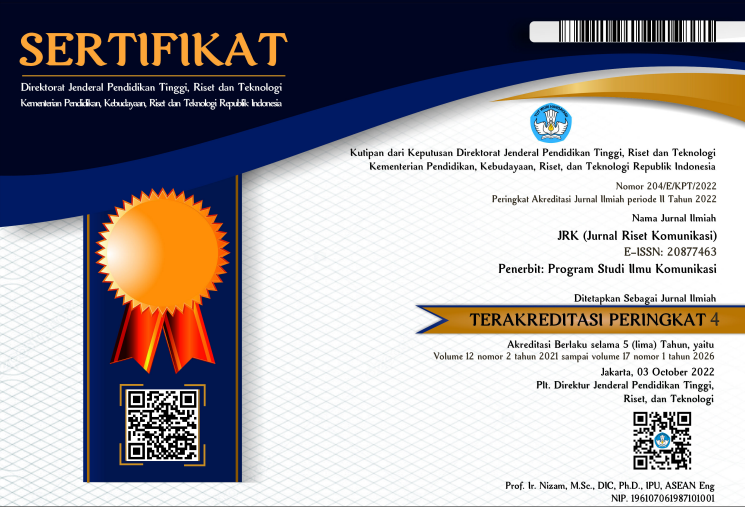Pengaruh Penggunaan Media Sosial X (Twitter) Terhadap Partisipasi Politik Pada Pemilu Presiden Republik Indonesia Tahun 2024
Abstract
Full Text:
314-328 PDF (Indonesian)References
Anggraheni, P., Setyowati, N. T., & Harry, H. (2021). SOCIAL MEDIA AND POLITICAL PARTICIPATION IN INDONESIA: RESTRICTIONS ACCESS AT ANNOUNCEMENT RESULTS OF 2019 PRESIDENTIAL ELECTION. ASPIRATION Journal, 2(1), 85–123. https://doi.org/10.56353/aspiration.v2i1.23
Boulianne, S. (2015). Social media use and participation: a meta-analysis of current research. Information, Communication & Society, 18(5), 524–538. https://doi.org/10.1080/1369118X.2015.1008542
Boulianne, S., & Theocharis, Y. (2020). Young People, Digital Media, and Engagement: A Meta-Analysis of Research. Social Science Computer Review, 38(2), 111–127. https://doi.org/10.1177/0894439318814190
Bright, J., Hale, S., Ganesh, B., Bulovsky, A., Margetts, H., & Howard, P. (2020). Does Campaigning on Social Media Make a Difference? Evidence From Candidate Use of Twitter During the 2015 and 2017 U.K. Elections. Communication Research, 47(7), 988–1009. https://doi.org/10.1177/0093650219872394
Chan, J. (2024). Online astroturfing: A problem beyond disinformation. Philosophy & Social Criticism, 50(3), 507–528. https://doi.org/10.1177/01914537221108467
Checkoway, B. N., & Gutierrez, L. M. (2006). Youth Participation and Community Change. Journal of Community Practice, 14(1–2), 1–9. https://doi.org/10.1300/J125v14n01_01
Cohen, C., & Kahne, J. (2012). Participatory Politics: New Media and Youth Political Action. Youth and Participatory Politics Research Network.
David Von Drehle. (2016, November 9). The Making of President Donald Trump. Time Magazine.
Ferrara, E., Varol, O., Davis, C., Menczer, F., & Flammini, A. (2016). The rise of social bots. Communications of the ACM, 59(7), 96–104. https://doi.org/10.1145/2818717
Gil de Zúñiga, H., Jung, N., & Valenzuela, S. (2012). Social Media Use for News and Individuals’ Social Capital, Civic Engagement and Political Participation. Journal of Computer-Mediated Communication, 17(3), 319–336. https://doi.org/10.1111/j.1083-6101.2012.01574.x
Gil de Zúñiga, H., Molyneux, L., & Zheng, P. (2014). Social Media, Political Expression, and Political Participation: Panel Analysis of Lagged and Concurrent Relationships. Journal of Communication, 64(4), 612–634. https://doi.org/10.1111/jcom.12103
Golbeck, J., Grimes, J. M., & Rogers, A. (2010). Twitter use by the U.S. Congress. Journal of the American Society for Information Science and Technology, 61(8), 1612–1621. https://doi.org/10.1002/asi.21344
Halim, U., & Jauhari, K. D. (2019). Pengaruh Terpaan Media Terhadap Partisipasi Politik Dalam Pilkada Dki Jakarta 2017. Jurnal ASPIKOM, 4(1), 45. https://doi.org/10.24329/aspikom.v4i1.385
Jannatania, J., Wibowo, S. K. A., Rohayati, H. S. M., Hidayat, D. R., & Indriani, S. S. (2022). Pengaruh Penggunaan Media Sosial Twitter Terhadap Partisipasi Online Budaya Pengenyahan (Cancel Culture) Di Indonesia. Jurnal Mutakallimin : Jurnal Ilmu Komunikasi, 5(2). https://doi.org/10.31602/jm.v5i2.7690
Kahne, J., & Middaugh, E. (2012). Digital Media Shapes Youth Participation in Politics. Phi Delta Kappan, 94(3), 52–56. https://doi.org/10.1177/003172171209400312
Kim, D. H., & Ellison, N. B. (2022). From observation on social media to offline political participation: The social media affordances approach. New Media & Society, 24(12), 2614–2634. https://doi.org/10.1177/1461444821998346
Kobayashi, T., & Ichifuji, Y. (2015). Tweets That Matter: Evidence From a Randomized Field Experiment in Japan. Political Communication, 32(4), 574–593. https://doi.org/10.1080/10584609.2014.986696
Lev‐On, A. (2017). Uses and Gratifications: Evidence for Various Media. In The International Encyclopedia of Media Effects (pp. 1–9). Wiley. https://doi.org/10.1002/9781118783764.wbieme0046
Miriam, B. (2008). Dasar-Dasar Ilmu Politik. Edisi Revisi. PT. Gramedia Pustaka Utama.
Mustapha, L. K., & Omar, B. (2020). Do social media matter? Examining social media use and youths’ political participation during the 2019 Nigerian general elections. Round Table, 109(4), 441–457. https://doi.org/10.1080/00358533.2020.1788766
Robin L. Nabi, & Mary Beth Oliver. (2009). The SAGE Handbook of Media Processes and Effects. SAGE.
S, M., U, H., Z, A., M, S., & S, A. (2018). Exploring the Link between the Use of Facebook and Political Participation among Youth in Pakistan. Journal of Political Sciences & Public Affairs, 06(01). https://doi.org/10.4172/2332-0761.1000315
Sahly, A., Shao, C., & Kwon, K. H. (2019). Social Media for Political Campaigns: An Examination of Trump’s and Clinton’s Frame Building and Its Effect on Audience Engagement. Social Media + Society, 5(2), 205630511985514. https://doi.org/10.1177/2056305119855141
Stier, S., Bleier, A., Lietz, H., & Strohmaier, M. (2018). Election Campaigning on Social Media: Politicians, Audiences, and the Mediation of Political Communication on Facebook and Twitter. Political Communication, 35(1), 50–74. https://doi.org/10.1080/10584609.2017.1334728
Sugiyono. (2016). Metode Penelitian Kuantitatif, Kualitatif dan R&D. Alfabeta.
Willnat, L., Wong, W. J., Tamam, E., & Aw, A. (2013). Online Media and Political Participation: The Case of Malaysia. Mass Communication and Society, 16(4), 557–585. https://doi.org/10.1080/15205436.2012.734891
DOI: http://dx.doi.org/10.31506/jrk.v15i2.29129
Refbacks
- There are currently no refbacks.









